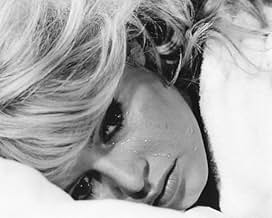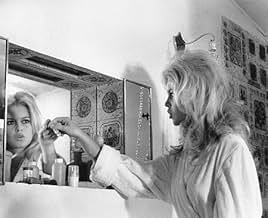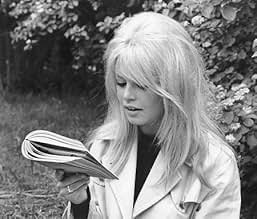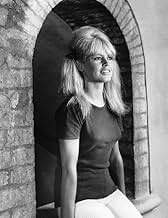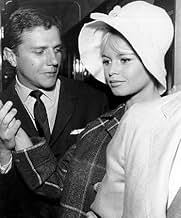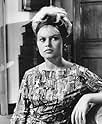Vie privée
- 1962
- 1h 43m
IMDb RATING
5.5/10
1.3K
YOUR RATING
When Jill becomes a movie star she soon discovers that her private life is destroyed by persistent fans that won't leave her alone. Her mother's ex-lover, Fabio, tries to protect her.When Jill becomes a movie star she soon discovers that her private life is destroyed by persistent fans that won't leave her alone. Her mother's ex-lover, Fabio, tries to protect her.When Jill becomes a movie star she soon discovers that her private life is destroyed by persistent fans that won't leave her alone. Her mother's ex-lover, Fabio, tries to protect her.
- Director
- Writers
- Stars
Paul Sorèze
- Maxime
- (as Paul Soreze)
Eléonore Hirt
- Cécile
- (as Eleonore Hirt)
Jeanne Allard
- La femme de ménage
- (uncredited)
Paul Apoteker
- Le caméraman
- (uncredited)
Jean-Claude Brialy
- Le narrateur
- (voice)
- (uncredited)
Claude Day
- L'éditeur
- (uncredited)
Christian de Tillière
- Albert
- (uncredited)
- Director
- Writers
- All cast & crew
- Production, box office & more at IMDbPro
Featured reviews
Reviewers have suggested that this is not among the best of Malle's output and that the two principals lack the fire of real heterosexual passion.
The second objection is perfectly right, because Jill seems incapable of a grown-up relationship with a man, just as she seems incapable of pursuing any worthwhile career beyond that of international sex-symbol. Being highly desirable and readily available may be huge fun in your teens and early twenties but does not lead to a fulfilling existence. Her trajectory is tragic, beauty that offers not life but a hollow illusion of life.
While Fabio cannot resist what he finds in his bed (few straight men could), his feelings for Jill seem more pity than lust. He wants to protect her from endless exploitation by others and from her own immaturity. But, having gained an international reputation for the magazine he edits and the play he is producing, he is not going to sacrifice his hard-won status for a bimbo. He is creative, adding to the world's culture, while she is merely decorative.
A relationship between two characters like this will be short of fire, and it would be Hollywoodian falsity to pretend that they are merely consumed with passion for each other.
As for the place of this piece in Malle's very varied body of work, his non-documentary dramas differ widely from each other with few overt links. Here one has to consider his own evolution: an artist's fourth picture made at age 30 does not compare with a mature and reflective masterpiece like "Au revoir les enfants" made at age 55. Films appreciated in Europe can be lost in America, particularly if mutilated by tone-deaf dubbing and puritanical cutting. Also, I would suggest, we might separate films set in the past or an imaginary future from films set in and therefore commenting on the present.
To show the real superstar Brigitte Bardot as a fictional empty superstar, virtually playing herself (compared with her more nuanced rôle for Godard a year later in "Le Mépris"), is satirical, poignant, and even, dare I say it, darkly comic. If you don't get the joke, though many would have in 1962, you may not rate the film highly.
The second objection is perfectly right, because Jill seems incapable of a grown-up relationship with a man, just as she seems incapable of pursuing any worthwhile career beyond that of international sex-symbol. Being highly desirable and readily available may be huge fun in your teens and early twenties but does not lead to a fulfilling existence. Her trajectory is tragic, beauty that offers not life but a hollow illusion of life.
While Fabio cannot resist what he finds in his bed (few straight men could), his feelings for Jill seem more pity than lust. He wants to protect her from endless exploitation by others and from her own immaturity. But, having gained an international reputation for the magazine he edits and the play he is producing, he is not going to sacrifice his hard-won status for a bimbo. He is creative, adding to the world's culture, while she is merely decorative.
A relationship between two characters like this will be short of fire, and it would be Hollywoodian falsity to pretend that they are merely consumed with passion for each other.
As for the place of this piece in Malle's very varied body of work, his non-documentary dramas differ widely from each other with few overt links. Here one has to consider his own evolution: an artist's fourth picture made at age 30 does not compare with a mature and reflective masterpiece like "Au revoir les enfants" made at age 55. Films appreciated in Europe can be lost in America, particularly if mutilated by tone-deaf dubbing and puritanical cutting. Also, I would suggest, we might separate films set in the past or an imaginary future from films set in and therefore commenting on the present.
To show the real superstar Brigitte Bardot as a fictional empty superstar, virtually playing herself (compared with her more nuanced rôle for Godard a year later in "Le Mépris"), is satirical, poignant, and even, dare I say it, darkly comic. If you don't get the joke, though many would have in 1962, you may not rate the film highly.
It was the dubbed version that I saw of this dreary little story about an actress (BB) who finds out, as is almost always the way, that her internal happiness is a sacrificial lamb to fame. Certainly good-looking - with La Bardot at her most luscious how could it not be? - but never very compelling.
The ending is, however, notable for going waaaaaay over the top. (Has anyone noticed how many Brigitte Bardot movies have unhappy endings?)
The ending is, however, notable for going waaaaaay over the top. (Has anyone noticed how many Brigitte Bardot movies have unhappy endings?)
Malle was an accomplished director of varied taste -- witness Pretty Baby (1977), a study in adolescent prostitution, and Au revoir les enfants (1986), a devastating account of youth in a private school in collaborationist France (with autobiographical hints.) But in Vie privee (1962) -- and please, it is Vie privee, not La vie privee (there is a difference) he achieved a dazzling, virtuosic, and at times subtle, at times hypnotic study of a movie starlet's sudden rise and precipitous fall from the limelight; her intense ambition, hiding a neurotic self-love, seems to evaporate as her life enters a new phase, becoming involved with a friend's former lover whom she had looked to for help. Bardot is captivating: she fills the screen, by turns stunning, radiant, and brooding, playing the role as though it were her life's story; add a suave and elegant Marcello Mastroianni as the glitterati who hides the fallen starlet from public view, and you have an electric mix. Watch the film in French with subtitles, please: only the original French conveys the cynical boredom of Jill (Bardot's character) and the paparazzi who swarm around her. And watch it also for Henri Decae's camera -- how it jumps from face to floor, cropping a doorway so that Bardot fills it, for example! -- and for Bernard Evein's glorious saturated colors. And the account of the Verdi Requiem at the Spoleto Festival makes a nice counterpoint to Jill's mundane existence with Fabio (Mastroianni). Oh -- the 'difference' mentioned in the French title is that without the 'La' ('the') vie privee carries a suggestion of 'a deprived life' as well as 'a private life.' Compare to the American version, called 'A Very Private Affair'!
Another reviewer mentioned nouvelle vague and it's true this film stinks of French New Wave. Of course the time was really the style's zenith when even boring pretentious garbage was treated like great art. Hard to take is the acting style that seems to come with the movement -very flat and anti-emotional - a little too Neo-realist for most tastes especially in America where actors tend to chew the scenery. Heck Tom Cruise apparently chews the scenery in ordinary life or at least on talk shows.
However I found there was a kind of chemistry and disturbing reality in Bardot's portrayal of the sex kitten. She was one moment almost catatonic and another bubbly. But how contemporary to see the star as a kind of trapped animal like a fox with dogs and hunters in pursuit. One could see this movie being remade with Brittany or another of the modern celebutantes in the starring role. Was Bardot playing herself? Well isn't that the kind of truth we look for in art? Malle could have been alluding to Marilyn or any modern celebrity caught in the maelstrom of fame. The relationship with Mastroanni seemed especially perceptive. He wants to protect her, but she wants to live and she can't. Certainly think Brittney could relate to this one especially to Jill's own mother selling her out to the press. We've seen that one lately, haven't we.
Not a fun movie but one that stays with you and that's rare these days.
However I found there was a kind of chemistry and disturbing reality in Bardot's portrayal of the sex kitten. She was one moment almost catatonic and another bubbly. But how contemporary to see the star as a kind of trapped animal like a fox with dogs and hunters in pursuit. One could see this movie being remade with Brittany or another of the modern celebutantes in the starring role. Was Bardot playing herself? Well isn't that the kind of truth we look for in art? Malle could have been alluding to Marilyn or any modern celebrity caught in the maelstrom of fame. The relationship with Mastroanni seemed especially perceptive. He wants to protect her, but she wants to live and she can't. Certainly think Brittney could relate to this one especially to Jill's own mother selling her out to the press. We've seen that one lately, haven't we.
Not a fun movie but one that stays with you and that's rare these days.
This movie did a great job of showing the French lifestyle and the time during which it was made. Most of the comments here are negative, but I thought this was one of the best movies I've seen in many months.
Jill's daily life, shown in the opening sequence when she travels by boat and bicycle to see her mother and various friends, is a wonderful example of European life where things are much prettier and healthier than in the US. Individuals are free to be with nature without making a conscious effort to do so.
The story of the movie is OK, not great, but certainly ahead of its time in the portrayal of the media culture. Diana Princess of Wales should have watched this movie.
Jill's daily life, shown in the opening sequence when she travels by boat and bicycle to see her mother and various friends, is a wonderful example of European life where things are much prettier and healthier than in the US. Individuals are free to be with nature without making a conscious effort to do so.
The story of the movie is OK, not great, but certainly ahead of its time in the portrayal of the media culture. Diana Princess of Wales should have watched this movie.
Did you know
- TriviaFrench actor Michel Auclair dubs Marcello Mastroianni's voice in French.
- ConnectionsFeatured in Censura: Alguns Cortes (1999)
- SoundtracksSidonie
Music by Jean-Max Rivière and Giannis Spanos
Lyrics by Charles Cros
Performed by Brigitte Bardot
- How long is A Very Private Affair?Powered by Alexa
Details
- Runtime1 hour 43 minutes
- Aspect ratio
- 1.85 : 1
Contribute to this page
Suggest an edit or add missing content



